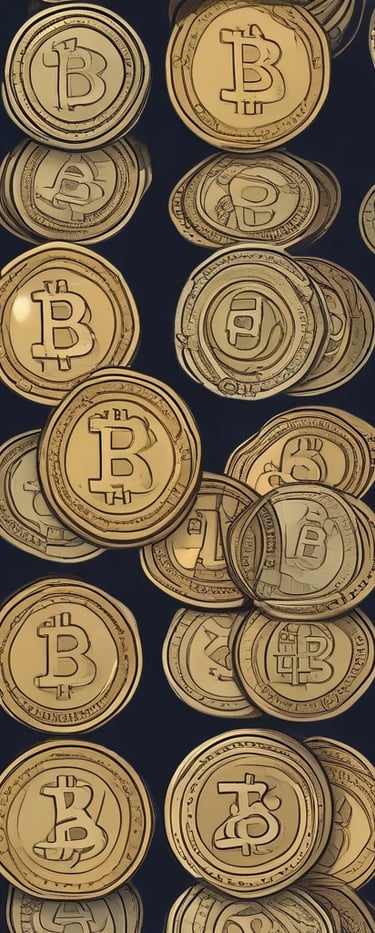Exploring Alternative Investments: A Beginners Guide to Non-Traditional Opportunities
Learn about alternative investments what is quickly growing beyond the traditional markets. Our blog pages offer tutorials on private markets, cryptocurrencies, real estate investment trusts (REITs), exchange traded funds (ETFs) and collectibles, empowering you to learn and navigate this fast growing diverse arena with confidence and expertise. Subscribe to YouTube Channel to stay informed and seize opportunities in the dynamic world of alternative investments.
John Nicholson
5/8/20243 min read
Collectibles
Collectibles encompass a huge variety of items from cars to comic books, matchbooks and much much more. Baseball cards and beyond come to mind in this intriguing facet of investing as well. Many people find just about anything collectible, if there is an interest there is probably a collector market. That being said it doesn't always equate to an investment grade collectible. Now when it comes to speaking about diamonds, gold, and other precious materials, people tend to call them investments.
Theoretically, these materials—and even stocks—could be termed collectibles because their price is based more on what people are willing to pay for them, known as their market value, rather than their intrinsic value. This is the calculated or perceived value of the good. Precious metals and stocks all have an intrinsic value.
For metals, this value is based on rarity. If you melt it, burn it, or bend it, you still have the same atomic substance in the end. For stocks, the value is produced by the underlying brick-and-mortar company that the share represents—a company that generates earnings to justify the prices you pay for its stock.
What makes collectibles different is that even a little damage can erase all of a collectible's value. This is because a collectible's value is based on nostalgia and other emotional factors—which can be erratic. Collectibles in pristine condition are valued higher than those that aren't. So, the value of a baseball card that's scratched or torn up is much lower than one still in its original condition.
Here is a great link to Investopedia which digs a little deeper into this topic,
https://www.investopedia.com/articles/basics/06/contemplatingcollectibles.asp
Cryptocurrency comes under many names. Bitcoin, Litecoin and Etheruem and more, You have probably heard about it quite a bit more lately due to its possible inclusion into use by the Trump administration. Many of the better known or more popular types of cryptocurrencies are Bitcoin, Litecoin, and Ethereum. Cryptocurrencies are becoming increasingly popular alternatives for online payments and will be used in the mainstream at some point in the future more prevalently. Before converting real dollars, euros, pounds, or other traditional currencies into ₿ (the symbol for Bitcoin, the most popular cryptocurrency), you should understand what cryptocurrencies are, what the risks are in using cryptocurrencies, and how to protect your investment.
What is cryptocurrency? A cryptocurrency is a digital currency, which is an alternative form of payment created using encryption algorithms. The use of encryption technologies means that cryptocurrencies function both as a currency and as a virtual accounting system. To use cryptocurrencies, you need a cryptocurrency wallet. These wallets can be software that is a cloud-based service or is stored on your computer or on your mobile device. The wallets are the tool through which you store your encryption keys that confirm your identity and link to your cryptocurrency.
What are the risks to using cryptocurrency? Cryptocurrencies are still relatively new, and the market for these digital currencies is very volatile. Since cryptocurrencies don't need banks or any other third party to regulate them; they tend to be uninsured and are hard to convert into a form of tangible currency (such as US dollars or euros.) In addition, since cryptocurrencies are technology-based intangible assets, they can be hacked like any other intangible technology asset. Finally, since you store your cryptocurrencies in a digital wallet, if you lose your wallet (or access to it or to wallet backups), you have lost your entire cryptocurrency investment.
Bitcoin usage will become much more prevalent in the United States in 2025. The Trump administration has promised a set of guidelines to become a road map of sorts and possibly a currency backup. We have a link below the New York State Department of Financial Services to show currently approved bitcoin currencies in use in numerous Exchange Traded Funds currently available as of 2024. The crypto currencies will offer several benefits in the United States, making it an appealing option for many individuals and businesses. Firstly, it provides a form of currency that operates independently of traditional banking systems, allowing for greater financial freedom. Additionally, Bitcoin transactions are often faster and cheaper than conventional banking methods, especially for international transfers Lastly, it serves as a hedge against inflation, as its supply is limited, potentially preserving value over time.




Bitcoin, Etheruem & Digital Stablecoins


Cryptocurrencies: Future Payments


Investing Beyond Tradition

Alternative Investments Center
Explore alternative investments beyond traditional options. Crypto currencies, precious metals, Real estate investment trusts (R.E.I.T.s) Rural Opportunity Zones and more.
Crypto
Assets
info@alternativeinvestments.center
© 2026. All rights reserved.
All investments may involve certain risks and potentially may lose value. The value of your investments may go up or down daily depending upon the and market conditions. Alternative strategies involve higher risks than traditional investments, may not be tax efficient, may have higher fees than traditional investments, they may also be highly leveraged and engage in speculative investment techniques, which can magnify the potential for investment loss or gain. Certain portions of this website are for exclusive use of "Accredited Investors" Any securities offering is private and you will be required to verify your status as an ‘Accredited Investor’. This is in order to participate in some offerings available here through The Alternative Investments Center Opportunity Zone Fund One LLP.
No securities commission or regulatory authority has recommended or approved any investment or the accuracy or completeness of any of the information or materials provided by or through us. Please refer to the investment opportunity and memorandum for additional information and disclaimers. Nothing contained on this website or videos constitutes tax, accounting, regulatory, legal, insurance or investment advice. Neither the information, nor any opinion, contained on this video or (videos) and website constitutes a solicitation or any offer by the Alternative Investments Center LLC, Virtual Advisor Group LLC. or its affiliates to buy or sell any securities, funds, futures, options or other financial instruments, nor shall any such security be offered or sold to any person in any jurisdiction in which such offer, solicitation, purchase, or sale would be unlawful under the securities laws of such jurisdiction.
Any decisions based on the information contained in this video or provided through the website are the sole responsibility of the viewer. In exchange for viewing of this video or use of this website, the visitor agrees to indemnify and hold the Alternative Investments Center LLC, Virtual Advisor Group LLC, its officers, directors, authors, consultants, employees, affiliates, agents, licensors and suppliers harmless against any and all claims, losses, liability, costs and expenses (including but not limited to attorney's fees) arising from the information provided through viewing of the videos or use of the website. The proposals, investments and strategies discussed in the video or website may not be suitable for all investors, ARE primarily geared towards high net worth accredited investor and are not obligations of the Alternative Investments Center LLC & Alternative Investments Center Fund One LLC, Virtual Advisor Group LLC or its affiliates or guaranteed by the Virtual Advisor Group LLC or its affiliates, consultants and employees. The Alternative Investments Center LLC & Alternative Investments Opportunity Zone Fund One LLC, The Virtual Advisor Group LLC make no representations that the contents are appropriate for use in all locations, or that the information, transactions, securities, products, instruments, or services discussed in the videos or on this site are available or appropriate for sale or use in all jurisdictions or countries, or by all investors or counter parties. Through making this information the Alternative Investments Center LLC, & Virtual Advisors Group LLC, does not represent that any investment vehicle or advice is better or worse, available or suitable for any particular user. All persons and entities viewing the video or accessing the website do so on their own initiative and are responsible for verifying their own compliance with applicable local laws and regulations. Fixed, Indexed and certain other Annuity products are contracts and require you to complete your due diligence like any other retirement or investment product before you purchase for your portfolio or goals.
Self directed I.R.A. investments are subject to certain prohibited transactions and regulations under I.R.S. rules. Fixed income investments are subject to risk including interest rates, credit, market and issuer risk. Currency exchange rates may cause the value of an investment to fluctuate up or down. Investment's targeted returns are presented to establish a benchmark for future evaluation of the investment's performance. Any target data or other forecasts contained herein are based upon subjective estimates and assumptions about circumstances and events that may not yet have taken place and may never take place. Targeted returns for this investment are projected gross returns to the Fund and are not net of Fund-level fees and expenses. There can be no assurance that the investment will achieve comparable results or meet its target returns. The Fund's targeted performance doesn't represent an actual investment. Targeted returns frequently have sharp differences from actual returns. The targeted returns are inclusive of appreciation and are net of fees.
There can be no assurance that the Fund will achieve comparable results or meet its target returns. This is not an offer to sell, or a solicitation of an offer to purchase any fund managed by the Alternative Investments Center Such an offer will be made only by an offering memorandum. This material is not financial advice. Returns are not guaranteed. Past performance is no guarantee of future results. All investments involve a degree of risk, including the risk of loss. Any historical returns, expected returns, or probability projections are not guaranteed and may not reflect actual future performance. Risk of Loss: All securities involve a high degree of risk and may result in partial or total loss of your investment. Liquidity Not Guaranteed: Investments offered by the Alternative investments Center are illiquid and there is never any guarantee that you will be able to exit your investments on the Secondary Market or at what price an exit (if any) will be achieved. Not a Public Exchange: The Alternative Investments Center Fund Secondary Market is NOT a stock exchange or public securities exchange, there is no guarantee of liquidity and no guarantee that the Alternative Investments Center Secondary Market will continue to operate or remain available to investors. Opportunity Zones Disclosure: The discussion regarding “Opportunity Zones” - including the viability of recycling proceeds from a sale or buyout - is based on advice received regarding the interpretation of provisions of the Tax Cut and Jobs Act of 2017 (the “Jobs Act”) and relevant guidance, including, among other things, the regulations issued by the IRS and Treasury Department. As such, we cannot predict what impact, if any, additional guidance, including future legislation, administrative rulings or court decisions will have on such unanswered questions and uncertainties and there is risk that any investment marketed as an Opportunity Zone investment will not qualify for, and investors will not realize the benefits they expect from, an Opportunity Zone investment. We also cannot guarantee any specific benefit or outcome of any investment made in reliance upon the above.